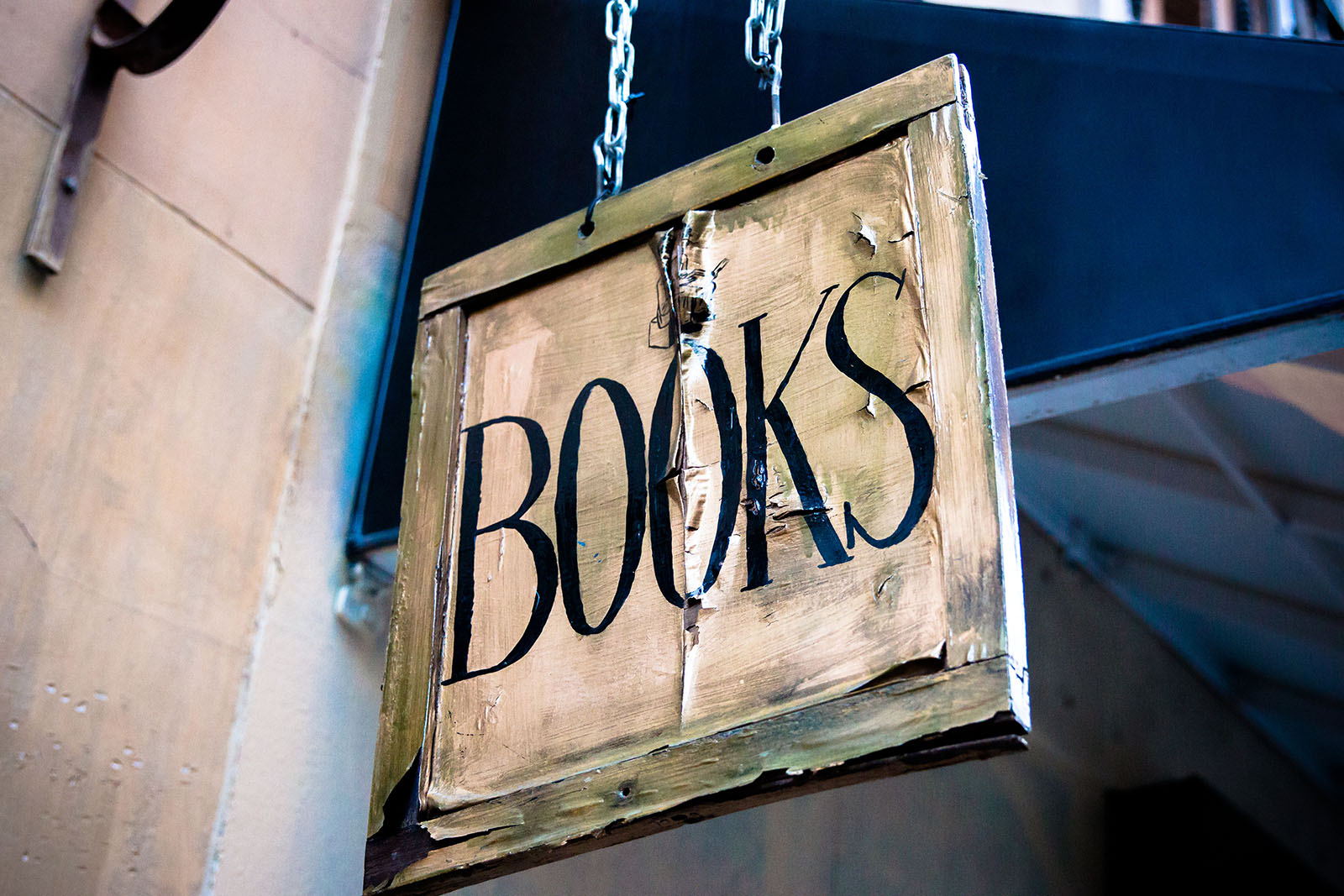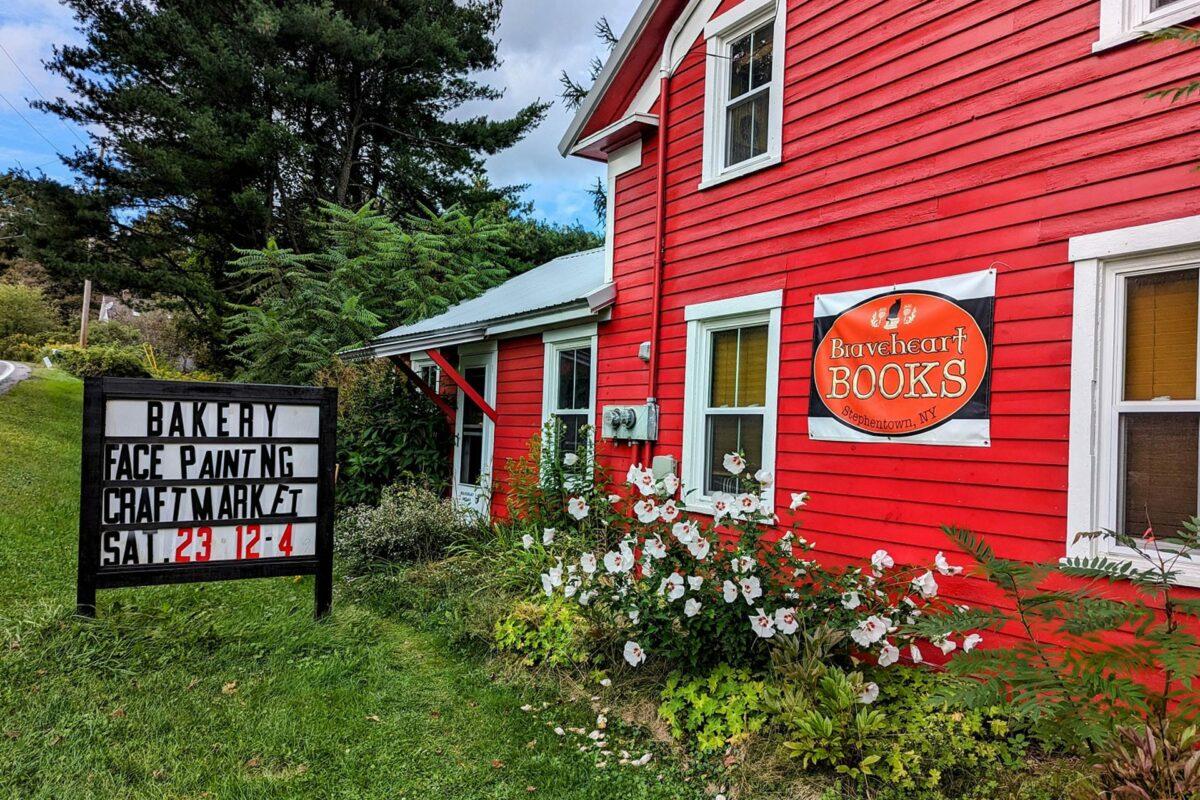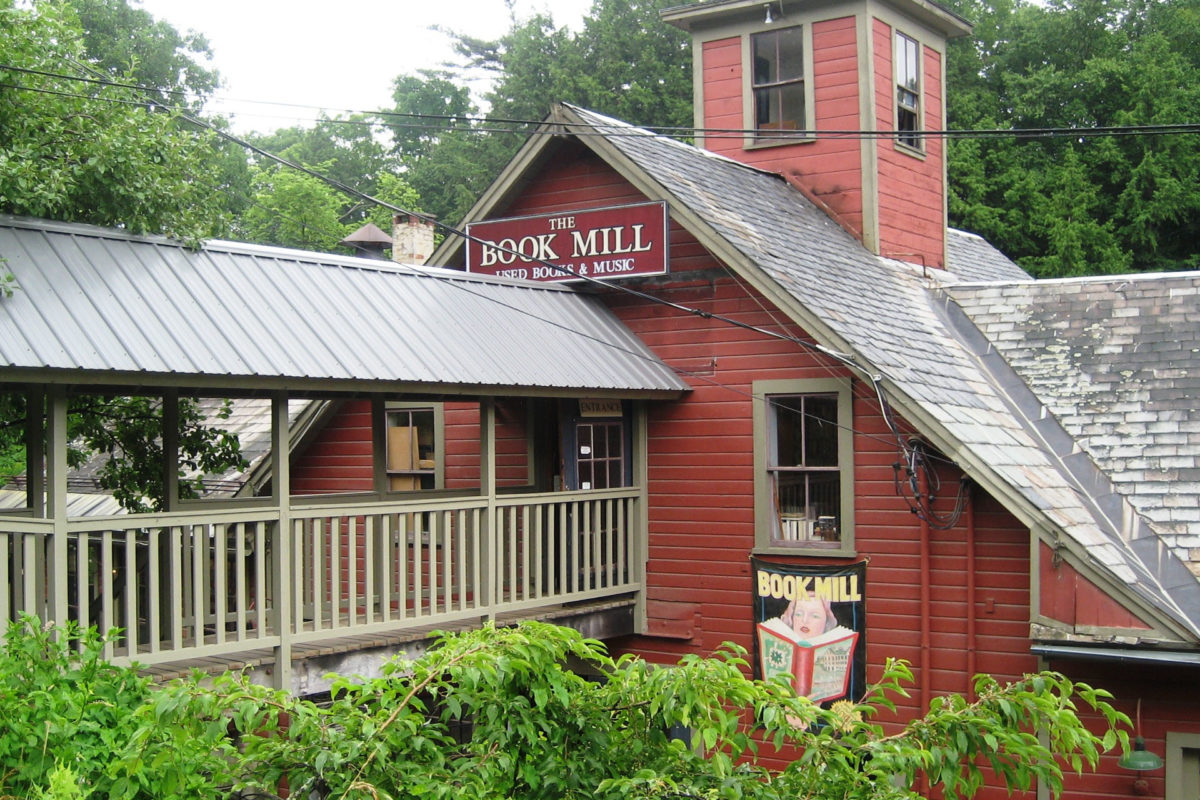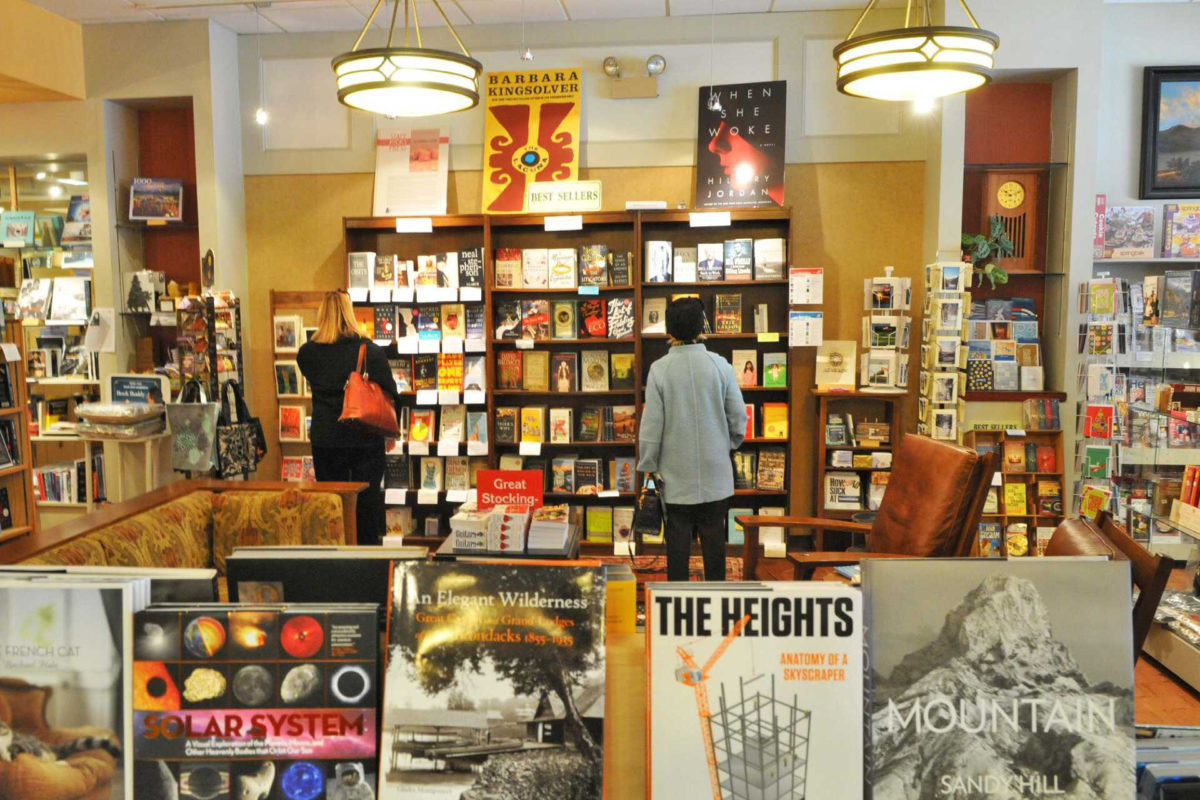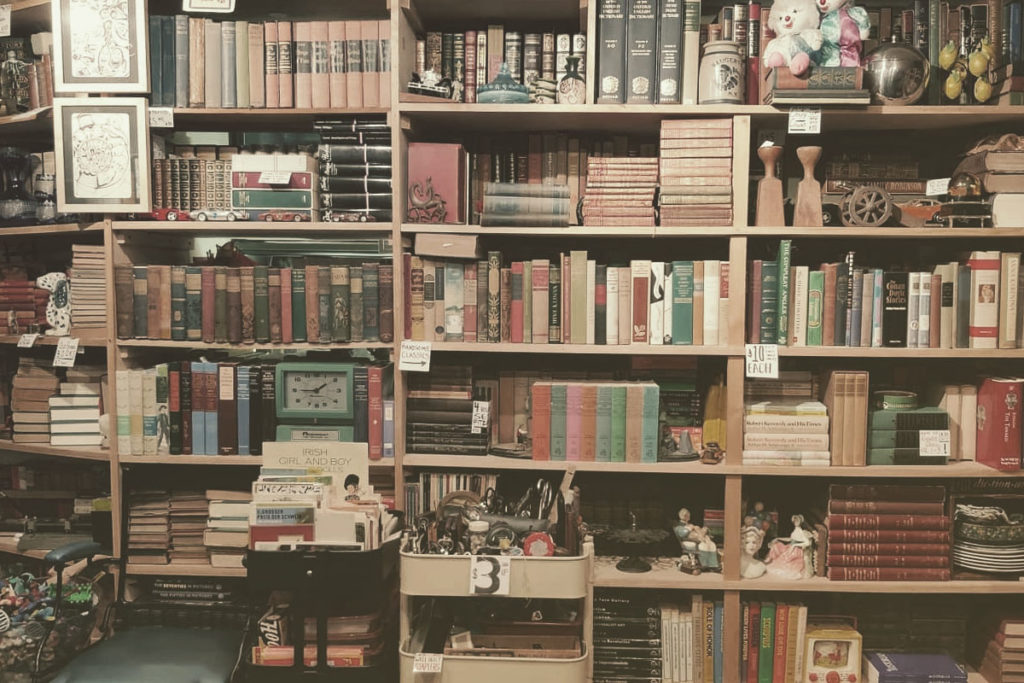I first met Jack Thompson not long after my divorce when he was also still married, something close to fourteen years ago. He was a clean-faced kid back then, loud with a full laugh and a mind running three flanks ahead of everyone else. His philosophical quotes infused with passionate nods to Beat poets and fringe thinkers filled any room he entered, but while he was the kind of friend who would light your evening on fire with gasoline and a cigarette, he would also disappear for months at a time—no social media, no calls or appearances, no letters in the mail. It had been almost two years since our last meeting when I walked into the Happy Cappuccino on cobbled narrow Jay Street in Schenectady, New York, to begin a day of book hunting together.
He wasn’t the same, but it was him all right.
He said the barista had asked him to leave just before I arrived, thinking he was a homeless person stealing warmth and a chair without buying a coffee. He certainly looked the part. In heavy layers of flannel and a robust black beard tuffting away from his face, he looked like a lumberjack who gave up the axe to start a tattoo parlor that had just been closed for indecent hedonism by the local Better Business Bureau. But his mind was intact, and even more robust than his beard, expounding upon humanity’s innate inability to maintain happiness, as well as the hardwired fear we have of making connections with unpredictable people and outcasts in our society, who only need those same connections to break through drug addictions, homelessness, and lovelessness to find redemption—a vicious Catch-22 life-cycle. All this with quote after quote, theory after theory.
And when he asked about myself, well, all I brought along that day was a desire to visit and review a handful of bookshops right there in Schenectady, old Electric City, and maybe drive out to see a few shops beyond in outlying Amsterdam and Johnstown. Simple enough, and he was happy to oblige my eagerness, maybe hopeful of finding a few books to suit his own Zen Buddhist philosophical curiosity. I was grateful for the company, and relieved to see Jack was still alive with wonder for a world that, from what I could tell from our talk, had been a brutal place for him in recent years, surrounded by those very people we had spoken of, the outcasts, the overlooked, the hounded and suffering. His final summation: “In a society that worships perfection, being human is a sin.”
As I often found with old Jack, it was hard to argue with his point, and it was equally hard to see him carry around such heavy burdens. But it also reminded me how lucky I was that my own brand of suffering over the years had clear routes of escape and lines of sight to better days. He, however, had a harder road ahead. I was hopeful that our day exploring books might be a welcomed aside, and I think we were both happy to be underway. Our first stop was just a two minute walk down the block at what would turn out to be the best bookshop of the bunch—The Open Door Bookstore, anchoring a long block of Jay Street.
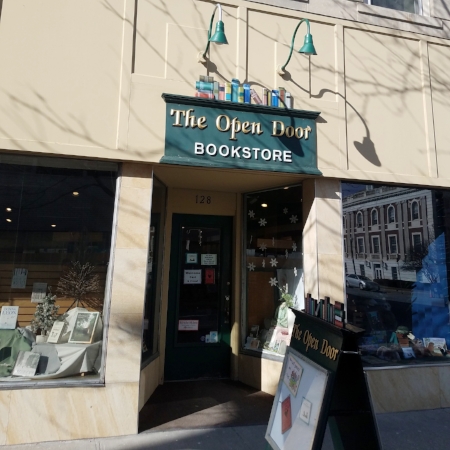 Let me say this about The Open Door—it falls into that category of bookshop I might call “the standard bearer,” and it set the bar high. You walk in and smell that smell, of ink, paper, and binding, clean aisles, warm and inviting, a well-lit shop specializing in new books of every variety, bestsellers and staff picks, rows and rows of nonfiction (and plenty of philosophical selections for old Jack) and all manner of mainstream fiction, mystery, sci-fi, fantasy, children’s YA, and more. The real kicker, and the thing that will set a good bookshop apart from any other, was the entire wall of half-off discounted new books, all in excellent condition covering as broad a selection of topics and genres as you could hope for. I found at least a dozen I wanted to buy, but settled on Nick Offerman’s Gumption and an intriguing New York Times nonfiction bestseller The Kick-Ass Librarians of Timbuktu. How’s that for a damned title, eh? Each was in mint condition, $8 apiece, no shipping. Eat your heart out, Amazon.
Let me say this about The Open Door—it falls into that category of bookshop I might call “the standard bearer,” and it set the bar high. You walk in and smell that smell, of ink, paper, and binding, clean aisles, warm and inviting, a well-lit shop specializing in new books of every variety, bestsellers and staff picks, rows and rows of nonfiction (and plenty of philosophical selections for old Jack) and all manner of mainstream fiction, mystery, sci-fi, fantasy, children’s YA, and more. The real kicker, and the thing that will set a good bookshop apart from any other, was the entire wall of half-off discounted new books, all in excellent condition covering as broad a selection of topics and genres as you could hope for. I found at least a dozen I wanted to buy, but settled on Nick Offerman’s Gumption and an intriguing New York Times nonfiction bestseller The Kick-Ass Librarians of Timbuktu. How’s that for a damned title, eh? Each was in mint condition, $8 apiece, no shipping. Eat your heart out, Amazon.
Paying at the register I even noticed they had a children’s writing competition. A bookstore sponsoring a writing competition! For kids! I could have gone home then and there, but we had work to do and places to go.
Next on our list was The Whitney Book Corner, just a few blocks away, easy to walk in the summer, but demanding a short hop by car in thirteen-degree weather. We parked in front of a row of pubs just up the block (making a mental note for later libations) and walked to the corner where flags whipped in the breeze to indicate we’d come to our bookish destination.
While not a bad shop by any stretch, Whitney Book Corner is an entirely different animal. It deals in used books, although there were a handful of newish looking hardbacks, including a first edition The Road by Cormac McCarthy. If I didn’t already own the same edition, I would have snatched it up for the low low price of $2, but seeing as I didn’t have cash and their credit card reader had died that morning, none of the books I had set aside were destined to come home. While many of the books lining the shelves throughout fell into that romance/Danielle Steele category of used book, there were enough interesting finds to make this shop worth a look. But small as the shop is, it won’t take you long to either find what you want or walk out the door empty handed, as I did.
The bookshops in Schenectady kept us on our toes, each hitting a different sweet spot across the spectrum of what a bookstore may be—new, old, cheap, used, musty and dusty, cozy and clean. W Somers Bookstore on Union immediately fell into the musty and dusty realm, and delightfully so. What it lacked in precision and order, it made up for in volume and diversity. W Somers is a veritable pack rat’s dream, with piles and stacks growing haphazard on every possible surface. Almost all the books were older, used, a little worn, but in good enough shape and fascinating to sift through. I’d never seen maritime books broken down into so many subcategories, and any bookshop with a subsection specifically for Pirate/Nonfiction is okay by me. I walked away with three books, one about old sailing ships ($5), one about the first crusade ($5), and Savage Country by Robert Olmstead, one of the newer books in the shop that was marked down to a mere $3. Sold, my good man.
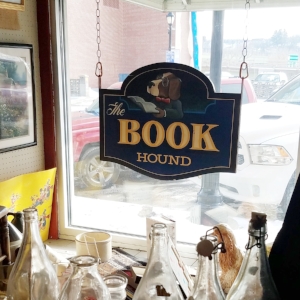
I wasn’t able to find any other independent bookshops in the Schenectady city limits, so we headed northwest where The Book Hound waited for us in the town of Amsterdam. There’s not much on the way out there, just a long stretch of highway dotted with rusted factories and wayward cottages along the banks of the frozen Mohawk River. The river ice looked like broken white glass swept up into the jagged piles with a thin gray trickle of water snaking through the middle. Rocky banks lined either side that looked desolate and gray even in the bright afternoon sun. The outskirts of Amsterdam looked just as stark in the cold light, not many souls out, and very few shops looked open. Even the library was burned out and boarded up, with blue tarps snapping in the wind and signs pleading the public for donations to rebuild. It wasn’t the best of omens.
The Book Hound felt like it had seen better days, but was by no means a shop to ignore. A small entryway contained more antiques than books belied what turned out to be a rather nice collection hidden behind a twisting maze of rooms. There was a small but diverse history and nonfiction section, with one nice oversize book of noir film art that I should have taken home. In the furthest reaches there was a dollar book shelf, where I found a concise but interesting primer on the Black Plague, and beyond there was a wall of fiction, poetry, and plays with enough notable names to give me a reason to linger. I walked away with two more books—poetry from William Carlos Williams and Dorothy Parker. All in all, The Book Hound turned out to be worth the trek, although the traffic in the area felt so sparse that I had to say a little prayer that they would hold on and prosper. From what I hear, so far so good.
Finally, we struck out for Mysteries on Main Street in Johnstown, NY, an even smaller community lying further northwest, set away from the ice-churned Mohawk and into the rolling foothills and farmland of the lower Adirondacks. I was happy to finally get there, with its tightly clustered homes and quaintly urban downtown, where the shop sits just at the far edge. I’m sure the town would have felt more alive had February not held it in its icy grip. Alas, the streets seemed a little lonely, just like Amsterdam, but we were there for books, not any sort of nightlife wild rampage, so in we went—to find an unexpected development.
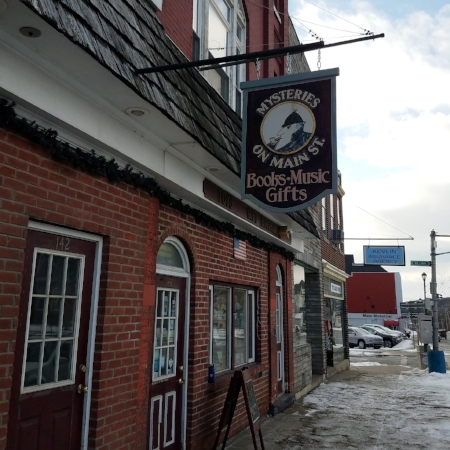 The shop’s name led me to believe I was entering a store that specialized in mysteries. It doesn’t. Mysteries on Main Street actually features new books with your typical fiction, nonfiction, paperbacks, and bestseller sections. It was clean and bright and felt as if it was plucked straight out of a more touristy town, with gift counters and trinkets and big brass-looking chandeliers hanging in the back rooms. Off to the side there’s an entryway to another few rooms (or what clearly used to be another shop) with classic literature, YA, children’s and more gifts, cards, candles, etc. It’s not huge, but you could easily while away an hour or more browsing from room to room. There aren’t any discount areas that I found at the time, so if you go, you’re going to buy new and pay the usual price you’d find in most Barnes and Noble stores.
The shop’s name led me to believe I was entering a store that specialized in mysteries. It doesn’t. Mysteries on Main Street actually features new books with your typical fiction, nonfiction, paperbacks, and bestseller sections. It was clean and bright and felt as if it was plucked straight out of a more touristy town, with gift counters and trinkets and big brass-looking chandeliers hanging in the back rooms. Off to the side there’s an entryway to another few rooms (or what clearly used to be another shop) with classic literature, YA, children’s and more gifts, cards, candles, etc. It’s not huge, but you could easily while away an hour or more browsing from room to room. There aren’t any discount areas that I found at the time, so if you go, you’re going to buy new and pay the usual price you’d find in most Barnes and Noble stores.
For this reason, I didn’t think the shop was what I’d call a “destination bookshop” but more of an outpost of literary necessities, the kind of place you’re glad exists if you live out that way and don’t want to drive the hour or more to a bigger, more robust shop. Some towns larger than Johnstown don’t have anything like it, it was great to see a full-sized bookstore in town. While I left without buying anything, that had more to do with me feeling tired and tapped out than the shop itself having nothing to offer. It had plenty, but it wasn’t a match that day.
And since my old pal Jack lived out that way, further north into the hills of central New York, we shook hands and parted ways. It was a quiet sort of goodbye at the end of a long day together, with not much more to say. But I felt lucky for having him along, for getting to watch him browse and inspect, to see his curiosity and cutting humor intact, even in the quietest of moments. It’s a pleasure to wander a shop alone knowing you have all the time in the world, but to do so with an old friend, one who knows you better than most, who will point out this book, or that poem, well, it adds a warm quality to any book hunt than cannot be overlooked or understated.
I’ll never be able to think of those shops or those dusty stretches of winter-whipped highway without also thinking of his roiling beard, inarguable insight, and a weariness hidden just behind his sharp, clever eyes. Jack may have driven into the gray evening dim to face a life in turmoil more alone than not, but there are few in this world I would trust to make it through with their laughter and brilliance intact, no matter how beaten and bruised they may become. And these books here with me, they’ll make me think of Jack too, page by page, year after year of looking out at me from my own shelves.
The magic of bookshops, books, and old friends—isn’t this why we set out bookshop hunting early in the morning on Saturdays, for all of this wonderment waiting for us? It is, Jack. It is. Trust me on that.
(This originally appeared in Five:2:One Magazine.)
